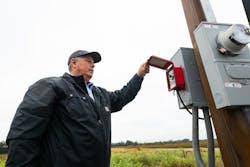Kellogg grant to save 9 billion gallons of water yearly
The Kellogg Company is collaborating with The Nature Conservancy (TNC) to provide efficient water irrigation resources to Arkansas rice farmers.
Thanks to a grant from Kellogg, The Nature Conservancy installed irrigation timers on 30 farms to manage water use on approximately 15,000 acres of land located predominantly in critical groundwater areas in the Delta of Arkansas. Farmers program the timers on their pumps to irrigate the field and when finished, the timers turn the pumps off automatically, thereby saving water. TNC scientists estimate that the timers will conserve 9 billion gallons of water each year.
"It's very helpful that Kellogg's is providing these timers," said Arkansas rice farmer Kotton Guest. "Their support makes it easier for us to use new conservation techniques."
Field flooding is an important part of the growing process as it helps to control weeds, mitigate soil erosion and maximize crop yields. The Mississippi Valley Alluvial Aquifer — an underground water source — provides 80% of the water used for rice growing in Arkansas; however, water levels have dropped dramatically due to excessive pumping.
"In many areas across the state, the aquifer has 10% or less water left in it," said Jason Milks, Delta Program Director at The Nature Conservancy in Arkansas. "For every minute the timer saves in pumping time, thousands of gallons of critical groundwater are conserved."
This Arkansas rice project is part of Kellogg's larger Supporting U.S. Farmers collaboration with The Nature Conservancy aimed at driving positive impact through conservation programs on 255,000 acres of land across Arkansas, Illinois, Michigan, and Nebraska.
